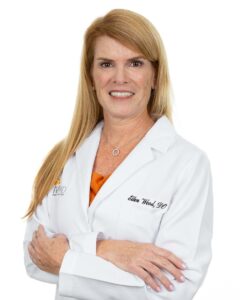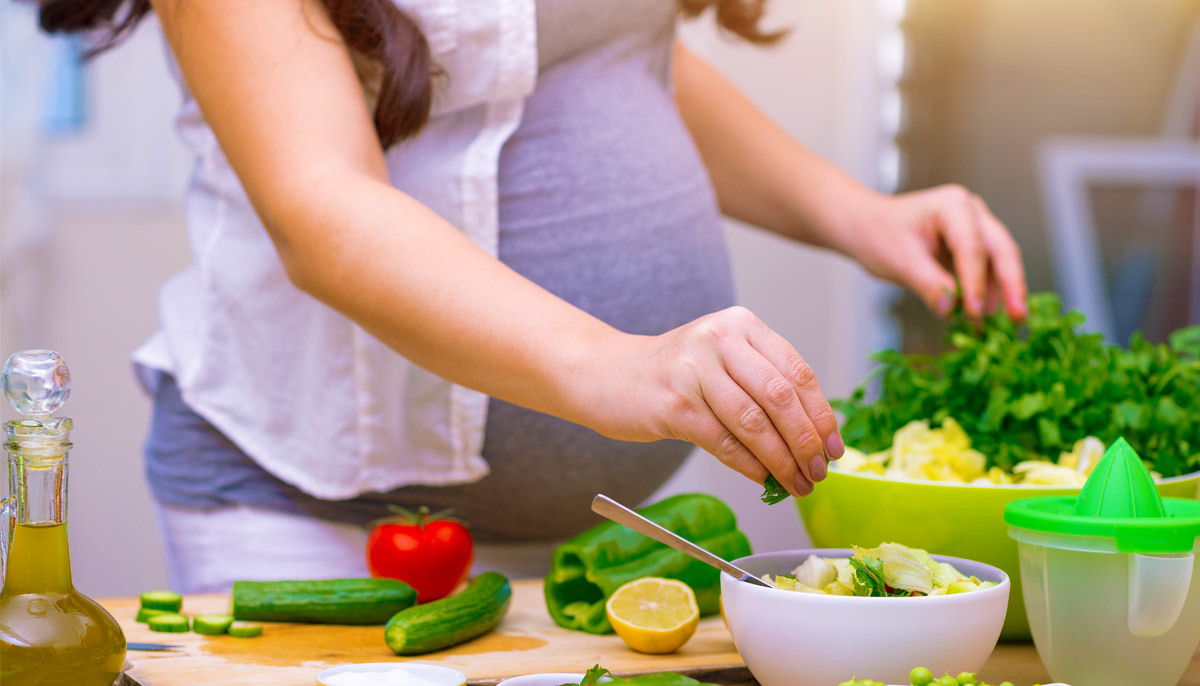Pregnancy care and even postpartum care is something that is often in the spotlight, but what about preconception care? For those trying to conceive is there anything that can be done to prepare your body for pregnancy? We reached out to one of our favorite Reproductive Endocrinologists, and an expert in reproductive health, Dr. Ellen Wood, DO, FACOOG from IVFMD to give us a run-down.
How far in advance should I start preparing my body to get pregnant?
Having a healthy pregnancy should start MONTHS before you are actually ready to have a baby. A healthy mom is critical to a healthy pregnancy and a healthy baby.
Get a physical exam! You should plan to have a one before you get pregnant. A good physical exam should involve checking height and weight and assessing your body mass index (BMI). BMI is an estimate of your body fat that is based on your height and weight. This assesses an adult’s current health status and potential health risks. In addition, your blood pressure should be checked and any medications you are currently taking should be assessed to make sure they are safe during pregnancy. If you have current illnesses such as high blood pressure, diabetes, or thyroid issues, these issues should be controlled before trying to conceive.
You should also be screened for sexually transmitted diseases and have an updated PAP smear or Mammogram done when indicated. A physical exam with either a primary care practitioner or OBGYN is also a GREAT chance to ask questions specific to the process of conceiving or about discontinuing your birth control.
What prenatal vitamins should I be taking and how far in advance should I start those?
Prenatal vitamins are your insurance policy. Taking them will not magically help you conceive or fix a horrible diet or prevent bad outcomes, but they will increase the chances of having a healthy baby. The most important ingredient in a prenatal vitamin is folic acid. Folic acid, for example, can help prevent neural tube defects when taken prior to and during very early pregnancy. Taking a folic acid supplement THREE months prior to conceiving will allow your body to achieve adequate stores of folic acid which a critical in the beginning stages of pregnancy when the neural tube is forming.
There are a lot of prenatal vitamins available and as a rule over-the-counter (OTC) vitamins go mainly unregulated. But truth is, you don’t need anything fancy, a standard multi-vitamin with the right amount of folic acid might be just right for you. However, there is a significant portion of the population that might not absorb folic acid as well as others, so I have a bias related to prenatal vitamins whether they are prescription or OTC. MAKE SURE IT CONTAINS Methylated 4th generation folate which is the most absorbable form of folic acid. Your prenatal vitamin should have at least 800 mcg or 1000 mcg of methylated 4th generation folate known as “Quatrefolic” to minimize the risk of a devastating neural tube defect.
Should I get genetic testing?
Carrier screening for genetically inherited diseases and counseling ideally should be performed BEFORE pregnancy. However, in the real world that rarely happens.
Once a woman becomes pregnant, she goes to see her obstetrician, and on a first visit information about genetic carrier screening is provided. The American College of Obstetrics and Gynecology (ACOG) recommends that pregnant woman be offered screening for Spinal Muscular Atrophy, Cystic Fibrosis, Hemoglobinopathies, Fragile X Syndrome and screening for Tay–Sachs disease should be offered when considering pregnancy or during pregnancy, if either member of a couple is of Ashkenazi Jewish, French–Canadian, or Cajun descent. Now here lies the problem, the patient is already pregnant and she finds out she carries the Spinal Muscular Atrophy (SMA) gene.
Now her partner needs to get screened which can take several weeks. The patient NOW finds out her partner also carries with the SMA gene. The health practitioner now discusses the risk to the pregnancy. There is a 1 in 4 chance that the baby could have the devastating lethal disease! The patient is now counseled regarding undergoing invasive testing with a chorionic villus sampling or an amniocentesis to determine if the baby is affected. These results then take several weeks. Now, at 15-17 weeks pregnant, the patient finds out the baby is either ok or affected. If the baby has the disease, the traumatizing decision of whether or not to terminate the pregnancy has to be made. This entire scenario can be prevented by getting screened before you get pregnant!
There are a lot of companies currently that screen for far more diseases than are in ACOG recommendations. The price of genetic testing has dropped dramatically, so for under $300 with most genetic companies, a patient can get information on whether or not she carries more than 250 genetic diseases. If a couple is aware that they both carry a genetic disease prior to pregnancy, they will then have the option to either “role the genetic dice” or pursue treatment with Assisted Reproductive Technology which will identify the diseased embryos prior to conceiving.
Is there a certain diet that I should be following?
There is no certain “pre-pregnancy diet.” With that said, to follow a diet that maximizes OVERALL health is key. Restrictive diets can lead to a vitamin deficiency that could affect the health of the pregnancy. I personally like a Mediterranean type diet as a general recommendation when trying to conceive. It emphasizes healthy fats, vegetables, and quality protein.
However, in PCOS patients there are high glycemic vegetables and fruits they should avoid, so the diet needs to be customized sometimes. But in general, I recommend 5 servings of veggies per day and 2 servings of fruit. Eat eggs for the choline 3-4 x per week. Have omega-3 rich fish (salmon, trout, sardines) at least 2x weekly. Eat a minimum of one plant-based protein-rich meal a week like legumes, beans, tofu, or tempeh. Eat 30 grams (a handful) of nuts or seeds most days. Use extra virgin olive oil as a primary fat source in cooking. Just make the plate colorful! No processed foods and limit simple carbohydrates – bread, white rice, potatoes, and any sweets.
In addition, we must remember that although plant-based eating sounds “healthy,” patients who follow a plant-based or a vegan type diet need to be screened for significant vitamin deficiencies prior to conceiving. It is very difficult to consume enough iron from non-animal sources for the majority of vegan/ plant-based eaters. The patients that I screen are usually all severely deficient in iron. They are also sometimes deficient in B12 and therefore are at high risk of severe anemia during pregnancy and need supplements.
There are certain things to begin AVOIDING while trying to conceive. Soft drinks and soda have been associated with reduced male and female fertility. Excess caffeine intake has been associated with miscarriage. Mercury rich fish like swordfish, shark, or tuna should be eaten sparingly. Excessive alcohol can lower both male and female fertility. Excess saturated fat and processed foods, in general, can lead to poor health. Avoid chips, pastries, pies, sweets simple carbohydrates, and processed meats.
Vitamin A supplements are not safe in pregnancy and should be avoided. And try an avoid BPA with is a chemical found in plastics and packaging. Use glass or stainless when containers when possible.
Do you recommend exercise and/or yoga during this phase?
Absolutely! Exercising 3-5 x weekly is essential for overall health which will improve pregnancy outcomes. Being physically active 30 minutes most days of the week is so important. However, excess exercise, HIIT workouts, and Tabata style workouts have been shown to lower the chances of conception. Keep your heart rate in “the green zone,” essentially lower than 150 bpm, and exercise will help not hinder your chances of becoming pregnant.
Should I be tracking my ovulation?
ABSOLUTELY! Tracking ovulation will definitely speed up the pregnancy process. The egg has a window of only 24 hours to be fertilized. You need to know that window! LH kits or ovulation predictor kits are the best way to do this. Intercourse or Intrauterine insemination is best done at least 2x in the 48 hours window once you see a + or smiley face on your ovulation test kit.
When should I see a fertility specialist?
In general, the rule is you should see a specialist if you are under 35 and have been trying to conceive without success for one year or if you are over the age of 35 you should seek help if you have not been successful after trying for 6 months. However, there are exceptions. If you are not having periods at all or your periods are extremely irregular, seek a specialist’s help right away! Also, if you have severe menstrual cramps, unusually heavy periods, pelvic pain or pain during intercourse, low libido, or problems achieving erection (for men) and you are trying to conceive, you need to see a reproductive specialist ASAP to help you on your journey.

Ellen Wood, DO, FACOOG, a provider at IVFMD in Cooper City, FL, is board certified in Obstetrics and Gynecology and in the subspecialty of Reproductive Endocrinology and Infertility. Dr. Wood is a member of the American Society for Reproductive Medicine and a distinguished fellow in the American College of Osteopathic Obstetricians and Gynecologists. She is a graduate of the University of Pennsylvania and completed her medical training and residency at the Philadelphia College of Osteopathic Medicine.
Dr. Wood is a mother of two daughters and has completed six full marathons, including the Boston Marathon in April 2013 and April 2014. She has also completed over 25 half marathons. She also enjoys water sports and is an avid water skier and wakeboarder.
